Music教案设计
最新高中英语Unit5Music教案1-新人教版
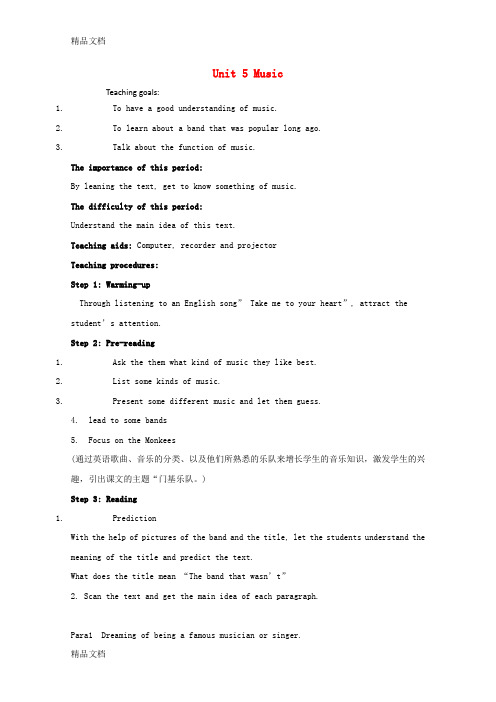
Unit 5 MusicTeaching goals:1. To have a good understanding of music.2. To learn about a band that was popular long ago.3. Talk about the function of music.The importance of this period:By leaning the text, get to know something of music.The difficulty of this period:Understand the main idea of this text.Teaching aids: Computer, recorder and projectorTeaching procedures:Step 1: Warming-upThrough listening to an English song” Take me to your heart”, attract the stu dent’s attention.Step 2: Pre-reading1. Ask the them what kind of music they like best.2. List some kinds of music.3. Present some different music and let them guess.4. lead to some bands5. Focus on the Monkees(通过英语歌曲、音乐的分类、以及他们所熟悉的乐队来增长学生的音乐知识,激发学生的兴趣,引出课文的主题“门基乐队。
)Step 3: Reading1. PredictionWith the help of pictures of the band and the title, let the students understand the meaning of the title and predict the text.What does the title mean “The band that wasn’t”2. Scan the text and get the main idea of each paragraph.Para1 Dreaming of being a famous musician or singer.Para2 How a band is formed?Para3 The Monkees got their start in a different way.Para4 How The Monkees became popular and developed as a real2. Detailed readingTrue or False Exercises.( T )1.Most musicians meet and form a band because they like to write and play music.( F)2. Each week the group that was called “The Beatles” would play a song or two written by other musicians.(T)3. “The Monkees” broke up in about 1970, but reunited in mid-1980s.(F)4. Students form a band to play in the street so that they can attract passers–by.3. Replace the following sentenceMany people think it important to have money and become famous.A lot of people attach great importance to becoming rich and famous4. Explain the difficult phrases.1)To think something is important and should be considered seriously(看重,重视)2) The musicians were to play jokes on each other as well as play music, most of whichwas based loosely on the Beatles.3) What’s the writer’s attitude towards the band?A. LikesB. DislikesC. Not mentioned(因为高考中阅读理解和阅读表达有替换、翻译以及深层理解题目的考查,这些又是学生的难点,所以我在阅读中加强了此类题目的训练)5 . a brief Summery of the band1) At first not a real band2) Play jokes as well as play music3) A year or so became serious about their music4) Became the most popular band in the USA.5) “I’m a believer”, top 10 hits6) Broke up in about 1970and reunited in the mid-1980s.Step4 Enjoy the VideoThe most famous song” I am A believer” by the MonkeesStep 5 DiscussionHow does music make you feel ?It makes me feel happy/confident ….I prefer /hate… because….If I am worried/frightened…I like to….I enjoy/appreciate…because….I attach great importance to…Step 6 SummaryMusic is fun and for your spirit!Try many different styles of music, and always remember that music will never be a waste of time.Without music, life is a journey through a desert.Step7 HomeworkWrite a short passage about what you feel about music.。
新人教版必修二Unit5-Music全单元教案
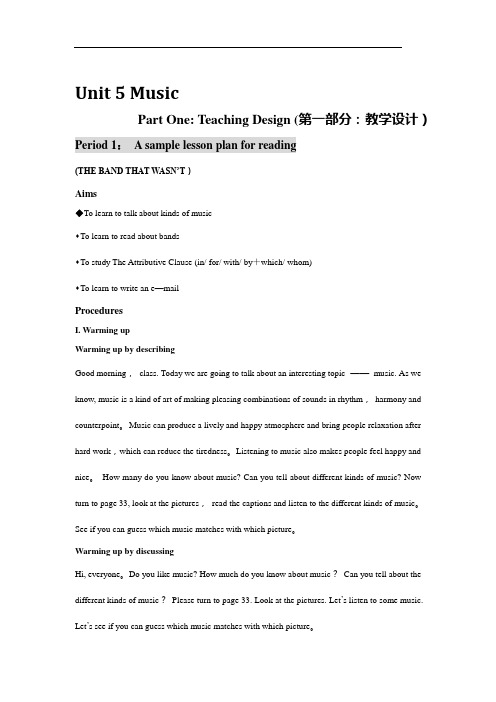
Unit 5 MusicPart One: Teaching Design (第一部分:教学设计)Period 1:A sample lesson plan for reading(THE BAND THAT W ASN’T)Aims◆To learn to talk about kinds of music◆To learn to read about bands◆To study The Attributive Clause (in/ for/ with/ by+which/ whom)◆To learn to write an e—mailProceduresI. Warming upWarming up by describingGood morning,class. Today we are going to talk about an interesting topic -——music. As we know, music is a kind of art of making pleasing combinations of sounds in rhythm,harmony and counterpoint。
Music can produce a lively and happy atmosphere and bring people relaxation after hard work,which can reduce the tiredness。
Listening to music also makes people feel happy and nice。
How many do you know about music? Can you tell about different kinds of music? Now turn to page 33, look at the pictures,read the captions and listen to the different kinds of music。
Unit8Music(教案)-北师大版英语六年级下册

教学过程
(2)老师领读。
(3)学生练习。
(4)学生展示。
Learn
to say
1、呈现情景
(1)告诉学生接下来他们要扮演乐队中的成员。
让学生看这一板块的图。
(2)结合插图告诉学生明天将有一场音乐会,让
学生猜一猜男孩将演奏什么乐器。
2、学习词汇
(1)采用问答方式引导学生猜测。
T: Will he play the violin?
(2)结合猜测,呈现短语play the flute/play
the violin/play the guitar/play the
piano/play the drums.
(3)播放对话录音,提示答案。
让学生指读,
跟读。
3、练习运用
(1)播放录音,让学生听,指插图、模仿。
(2)教师在黑板上呈现对话中的What will you
play at the concert? Will you play the …?
的句式,学生两人一组练习对话,一人询问,另
一人扮演大图中的一个乐器演奏者做出肯定或否
定的回答。
(3)学生展示,教师评价。
高中英语 Module 3《music》教案 外研版必修2

Module 3 musicAims and requirements●To enable the students to listen and talk about likes and dislikes (especially about music and musicians),encouraging them to try the vocabulary and everyday English in this unit●To develop the students’ reading ability●To help the students learn and use two grammars (adverbial clause of time and the past perfect tense) in different situations●To help the students to write a biography of a person, using the time expressions in Grammar 1Teaching proceduresPeriod 1 Introduction ,Warming upTeaching aims:Enabling the students to1. know some words about music2. know something about three great posersstep1. Warming up by listening pieces of music and asking questionsPlay several pieces of music (music from Haydn, Mozart and Beethoven will be best) to let the students listen and appreciate, then ask them:1) Do you like music?2) What about these pieces?3) What is your favorite kind of music?4) Who is your favorite musician? And who is your favorite poser?step2. Warming up by showing some pictures and discussing1) Do you know who they are?2) What kind of things are these pictures connected with, science, culture, politics, painting, drawing or music?step3. Warming up by listening to a piece of musicGood morning, class. Today we are going to read a passage about three great musicians who are all posers. A poser is a musician who writes pieces of beautiful music forothers to sing or to play. Now,let’s listen to a piece of music.(the teacher playsa piece of music ----er quan yingyue)1.do you know what kind of music it is?2.whose work is it?3.what kind of music is it?4.what is your feeling after listening to it?Step 4 show the following picturesAnd make the students familiar with these new words:Piano violin saxphone drum erhu guitarste p4.now please match these musical instruments with their names.Step 5 work in groups to discuss these questions:1.which of the instruments do you like listening to?2.which famous musicians play them?3.is the chinese instruments different from the other instruments?describe thedifference,if there is one.Step6 summary and homework:Today we’ve learnt the Introduction,know something about music,and we’ve also learnt some new words.The homework:1.Try to instruct your favorite musician to your class orally.2.Learn the new words again, using the dictionary if necessaryPeriods 2 Reading and VocabularyTeaching Aims:Train the students' reading ability.Learn some useful words and expressions.Teaching Important Points.Help the students to understand the passage better.Learn and master some important words and phrases in this period.Teaching Difficult Points:How to help the students improve their reading and understand the passage better. Teaching Methods:Fast reading to get the general idea of the text.Careful reading to understand the passage better.Discussion to help the students understand what they've learned better. Teaching procedure.Step 1 Lead --inThe teacher may play a kind of music written by Beethoven.------- What kind of music do you think it?----- Who do you know wrote it ?The teacher may discuss the questions and answer them freely.T: As we know, there are various kinds of music around the world. They all have their own obvious characteristic. And also there were famous posers such as Joseph Haydn, Mozart, and Beethoven. Today we may learn of their life from the text.Step 2 Reading prehension.Fast reading: Read the passage quickly and choose the best title.A.Three Great Austrian posers.B.Three Great poser of the eighteenth Century.C.Three Great Child posers.Key: B.Now let's read the passage again, underline new words in the text and decide whether the following statements are right or not.1.The three posers were all born in Austria.2.Mozart had a beautiful singing voice.3.Mozart died before his fortieth birthday.4.Beethoven once worked at the court of a prince, who began to go deaf when he grew older.5.Beethoven had ever met Haydn, but he didn't think he taught him a lot.6.Both Haydn and Mozart had fathers who were musicians.Key:1.F Beethoven was born in Bonn, Germany.2.F. Haydn had a good singing voice.3.T4.F. Haydn once worked at the court of a prince, but he didn't go deaf.5.T6.F. Haydn was the son of a peasant( The teacher may begin with the T/F questions orally and this is a good time to test their listening abilities as well as their prehension of the text. )Step 3 Read and listen to the passage. Meanwhile, some more questions are waiting for you.1.How did Haydn change the form of symphonies?2.How long did he work in eastern Austria?3.How many pieces of music did Mozart pose?4.How old was he when he played for the Empress of Austria?5.How long were Mozart and Haydn friends?6.Who taught Beethoven how to play the piano?7.Did he stop posing when he became deaf?Keys:1 He changed the symphony into a long piece for a large orchestra.2. 30 years.3.More than 600 pieces of music.4. When he was 6 , he played the harpsichord in a concert for the Empress of Austria.Periods 3, Function and GrammarTeaching aims:1 To learn grammar rules2 To use the grammar rules for correct munication3 To study co-operatelyTeaching important points: To use the correct tense and the proper conj. Teaching difficult points: To use correctly the two tenses and the three conj. Teaching methods: Explanation and practiceTeaching procedure:Step Ⅰby telling the class what happened to the Shenzhou Ⅻlot in the area of.Shenzhou Ⅻand the whole nation were waiting and I came back home fromschool and heard the news, I couldn’t help getting exciteed. I feelproud of our country.Step Ⅱ Grammar 11 Make sentences with “when , while, e in , have a lesson〞( Here is a picture of a classroom and a student ing in)A When he came in, we were having a lesson.B When we were having a lesson, he came in.C While we were having a lesson, he came in.2 Say the meaning of “as〞 in the following sentences.D As he was a child, he studied drawing.E As he grew older, he began to go deaf.F He listened to music as he walked.当…之时随着一边…一边…3Answer the three questions.When we talk about a single event in the past,we use when as in A .When we talk about a period of time in the past,we use when/ while / asas in B C D.We use as to refer to a progressive change as in E F .4Practiceplete the following sentences with “when ,while , as〞(1) ___she was studying at school, she also sang in the school choir.(2) ___he was living in Vienna, he studied music.(3) ___she met bach,she was only 20 years old.(4) ___he grew older, he found it more difficult to pose music(5) ___he was playing in the orchestra, he met his wife.(6) ___he was working in Hollywood, he became ill and died.(7) ___I listened to the violin solo, I fell in love with classical music.(8) ___they toured Europe for 10 years, they finnally decided to live inAustrilia.Step Ⅲ Grammar 2 The past perfect tense1Read the following sentences and summarise rules, paying attention to tenses. Fill in the blanks.After Liping had finished doing his homework, he turned on the TV.After they had got everything ready, they began to do the experiment.Before he came to our school, he had taught English for several years.Before his letter reached me, I had received his telephone call.They had finished the project by last month.I had left the country by the time the letter reached me.had done before diddid after had donehad done by did/past time2 PracticeWorkbook Grammar (2)(3)(4)plete the sentences using the verbs in brackets and the past simple or past perfect tense.Step Ⅳ1 Game Oral practice ,pair work.Ask and answer questions using all kinds of tenses.Example:-- When did you have your breakfast this morning?-- At 6.-- Have you prepared for the English lesson?-- Yes, I have. I have finished the exercises in the workbook.2 Watch a vedio play.Step Ⅴ Sum upAsk some students to make sentences using “when, while, as, before, after, by〞. Step Ⅵ Homework: Present a biography of a famous Chinese musician or poser.Periods 4 Speaking and WritingTeaching Aims:1.Knowledge and Skilla.To develop speaking ability by talking about likes and dislikes.b.To learn about some vocabulary and knowledge related to music and posers.c.To develop writing ability by presenting a biography of a famous Chinesemusician or poser.d.Train the ability of collecting and dealing with information, and developtheir abilities of getting new information, munication and cooperation.2.Emotion and Valuesa.To raise students’ interests in science and form the right attitude towardsall kinds of music.b.To help them know Chinese traditional music well and cultivate their interestin playing some Chinese instrument.3. Character-building:a.To make them know how to enjoy different kinds of music.b.Arouse their interest of playing some kinds of instrument and enrich theirleisure time.4. Cross-cultural awarenessa.To help them know the difference between China and some western countries ininstruments.b.Cultivate their awareness of cultural munication through the speciallanguage—music.Difficulties and Importance:a.To make the students understand and grasp the vocabulary and knowledge relatedto music.b.To enable the students to know how to use adverbial clause of time. Teaching Method:a.Task-based methodologyb.municative ApproachTeaching Procedures:Step 1 Pre-readingLook at the picture and answer the following questions.1.Who is he?2.Have you ever know something about him?Step 2 While-readinga. SkimmingRead the passage quickly, and make a note of some basic information about Ye xiaogang.Suggested answers:b. Detailed readingRead the passage carefully and fill in the blanks with proper words. Find what Ye Xiaogang did or what happened to him in the following years:Suggested answers:Step 3. Post-readingDiscussion.1.Are there any similarities between Ye Xiaogang and the European posers you haveread about in this module?2.Do you think it is a good idea to mix Chinese and western music?Step 4 Everyday Englisha. Listen to two people talking about the way they listen to music and answer the questions.1.How do they listen to it?2.Are they happy with the way they listen to music?3.What does Anna offer to do for Tom?b. work in pairs. Discuss your favourite music and how you listen to it.Step 4 Guided writingWrite a short passage of a famous singer in China—Han Hong.The following words may help you:1. sing well successful song writer2.born in1971 in Tibet(某某)3. young watch her mother sing and dance4. at the age of nine professional(专业的) training in Beijing.5. in 1985 her first national prize6. write songs in 19937. song Hometown number one in ChinaHomework:1.Finish writing the biography of Han Hong—a famous Chinese singer.2.Finish other exercises in this module.Periods 5 culture cornerTeaching aims:Enabling the students to1. to know sth about Ye Xiaogang2. write a biography of a famous Chinese musician or poser.Teaching steps:I. Ask some students to say something about Mozart.Give as many details as possible. II. Try to think of a Chinese musician or poser, eg. Xu Peidong.Gather these materials.1. when, where and in what kind of family he/ she was born.2. how he/ she spent his/ her childhood or youth.3. about his/ her education4. what are his/ her famous works5. what his/ her style is / wasGroup work. Ask the students to discuss about the musician or poser.Then ask some students to stand up to say sth. about the musician or poser.Correct the mistakes if any.III. Cultural Corner.Ye Xiaogang1. Listen to the passage and try to find the answer to this question:When did his album Horizon appear? (in 1986)2. Read the passage thoroughly and make a note of the information about Ye Xiaogang.Name:_________________ Sex: __________________Nationality:_____________ Job:___________________Main achievements: ____________________________________________Style of music: ____________________________What he did or happened to him in the following years:1955: ___________________________________________From 1978 to 1983: ___________________________________________1985: ___________________________________________1986: ___________________________________________1996: ___________________________________________3. Check the answers with the whole class. Then ask one or two students to say sth about Ye Xiaogang with the help of the notes made.4. Language points:1) work as2) leading modern posers 主要作曲家leading article 社论the leading cause 主要原因a leading role 主角3) mix A with B= mix A and B togethermix win with waterNever mix with such people.mix up 弄混,弄错It’s mon to mix him up with his brother.弄乱mix up the papersmix up those data4) receive many prizes5) part ofIV. Homework:Write a short passage about the Chinese musician or poser we talked about this period.。
音乐课教案(9篇)
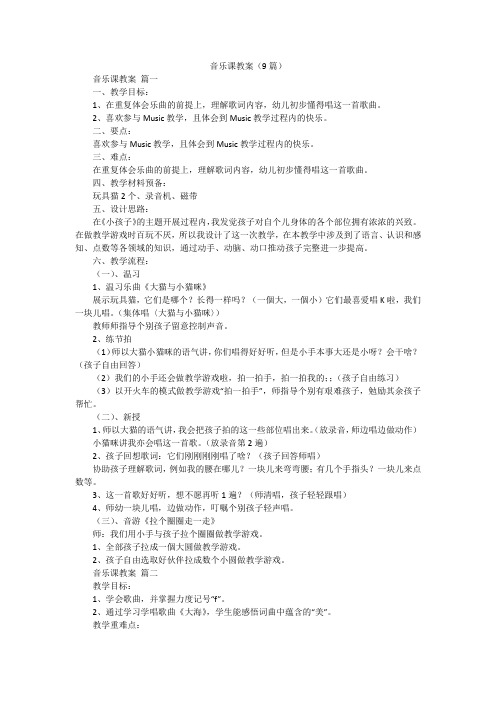
音乐课教案(9篇)音乐课教案篇一一、教学目标:1、在重复体会乐曲的前提上,理解歌词内容,幼儿初步懂得唱这一首歌曲。
2、喜欢参与Music教学,且体会到Music教学过程内的快乐。
二、要点:喜欢参与Music教学,且体会到Music教学过程内的快乐。
三、难点:在重复体会乐曲的前提上,理解歌词内容,幼儿初步懂得唱这一首歌曲。
四、教学材料预备:玩具猫2个、录音机、磁带五、设计思路:在《小孩子》的主题开展过程内,我发觉孩子对自个儿身体的各个部位拥有浓浓的兴致。
在做教学游戏时百玩不厌,所以我设计了这一次教学,在本教学中涉及到了语言、认识和感知、点数等各领域的知识,通过动手、动脑、动口推动孩子完整进一步提高。
六、教学流程:(一)、温习1、温习乐曲《大猫与小猫咪》展示玩具猫,它们是哪个?长得一样吗?(一個大,一個小)它们最喜爱唱K啦,我们一块儿唱。
(集体唱〈大猫与小猫咪〉)教师师指导个别孩子留意控制声音。
2、练节拍(1)师以大猫小猫咪的语气讲,你们唱得好好听,但是小手本事大还是小呀?会干啥?(孩子自由回答)(2)我们的小手还会做教学游戏啦,拍一拍手,拍一拍我的;;(孩子自由练习)(3)以开火车的模式做教学游戏“拍一拍手”,师指导个别有艰难孩子,勉励其余孩子帮忙。
(二)、新授1、师以大猫的语气讲,我会把孩子拍的这一些部位唱出来。
(放录音,师边唱边做动作)小猫咪讲我亦会唱这一首歌。
(放录音第2遍)2、孩子回想歌词:它们刚刚刚刚唱了啥?(孩子回答师唱)协助孩子理解歌词,例如我的腰在哪儿?一块儿来弯弯腰;有几个手指头?一块儿来点数等。
3、这一首歌好好听,想不愿再听1遍?(师清唱,孩子轻轻跟唱)4、师幼一块儿唱,边做动作,叮嘱个别孩子轻声唱。
(三)、音游《拉个圈圈走一走》师:我们用小手与孩子拉个圈圈做教学游戏。
1、全部孩子拉成一個大圆做教学游戏。
2、孩子自由选取好伙伴拉成数个小圆做教学游戏。
音乐课教案篇二教学目标:1、学会歌曲,并掌握力度记号“f”。
高中英语人教版(2022)必修第二册Unit5Music单元教案案(含答案)
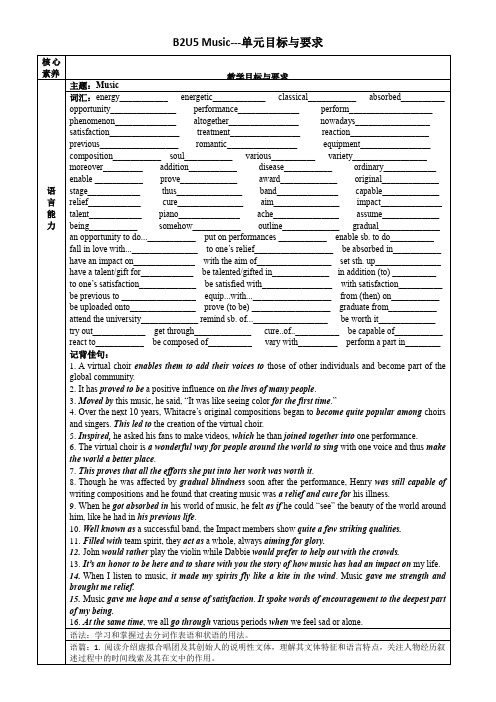
B2U5 Music---单元目标与要求语法:过去分词作表语和状语一、过去分词作表语1.过去分词可放在系动词be, get, feel, look, sound, taste, smell, remain, seem,become等之后作表语, 表示主语所处的状态。
1). He seemed quite ______________(delight) at the news.2). The door remained ____________(lock) when we arrived.2. 过去分词作表语多表示人自身的感觉、感受或事物自身的状态;现在分词作表语则多表示事物具有的特征,常译作“令人...的”。
常用的这类词有:exciting/excited; astonishing/astonished delighting/delighted moving/moved disappointing/disappointed encouraging/encouraged frightening/frightened interesting/interested3). The story they heard over the radio was very _____________(move).4). They were _____________ to hear the _______________ sound.(frighten)3. 过去分词作表语和被动语态的区别“be+过去分词”表状态时,是系表结构,此时过去分词通常已形容词化;表动作时,是被动语态,且绝大多数被动结构中的动作执行者由介词by引出。
5). 这本书写得好。
______________________________________________________________6). 这本书是鲁迅写的。
__________________________________________________________二、过去分词(短语)作状语1. 主从句主语一致,可以省略状语从句中的主语,省略的主语和动词主动关系用doing,被动关系则用done。
外研版高中英语必修二《Music》优质课公开课课件、教案

外研版高中英语必修二《Music》优质课公开课课件、教案Module 3 MusicI.教学内容分斩本模块以“Music”为话题。
学生通过本模块的学习可以了解古今中外的音乐家,提高他们的音乐欣赏水平,培养他们对音乐的评价和鉴赏能力,从而丰富学生的音乐知识,提高学生的艺术修养。
Introduction部分通过设计的两个活动让学生复习和学习一些常见的乐器的名称,激发学生学习本模块的兴趣。
Reading and Vocabulary该部分向同学们介绍了音乐家海顿、莫扎特和贝多芬以及他们的伟大成就。
让同学们在阅读的过程中了解音乐家的奋斗历程,树立正确的人生观和价值观。
通过相关的活动,训练学生的综合语言能力。
Grammar 1学习并巩固时间状语从句。
Writing要求学生阅读一封外国朋友的电子邮件,并根据问题写一封回信。
Function通过回答问题和完成句子让学生懂得如何表达喜好和厌恶,从而初步培养学生的鉴赏能力。
Listening and Vocabulary首先通过听力活动帮助学生了解和学习有关英国乐队The Beatles的背景知识,接着让学生学习新的词汇。
在训练学生听力的同时考查学生的理解能力。
Grammar 2复习过去完成时态。
通过练习帮助学生巩固过去完成时态的基本用法。
Pronunciation学会如何在日常交际中使用升调和降调。
Everyday English要求学生掌握表达喜好的一些用语和有关音乐的日常用语。
Cultural Corner学习一篇有关著名作曲家叶小刚的文章,了解他的音乐经历和音乐成就,增强学生的民族自豪感。
Task训练学生仿写一篇介绍著名音乐家生平和作品的文章。
Module File对整个模块的学习内容进行归纳总结,有助于学生对所学知识进行复习和巩固。
II.教学重点和难点1.教学重点(1)本模块的生词和短语。
(2)弄清楚时间状语从句和过去完成时态的用法。
(3)谈论有关音乐的话题。
2019新人教高中英语必修二Unit5 Music整单元完整教案
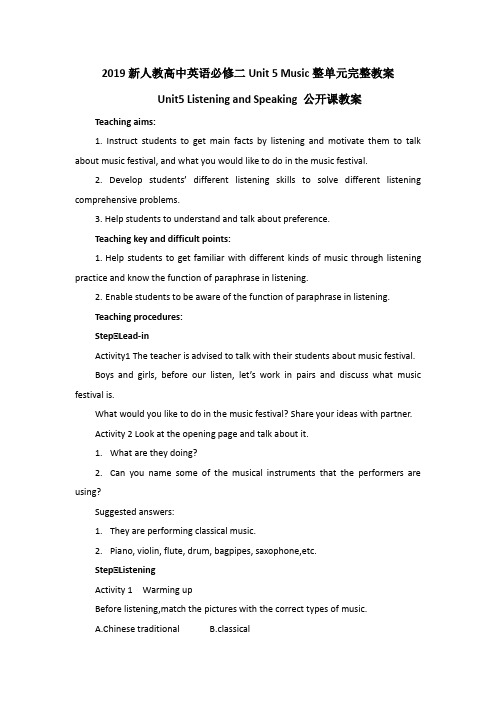
2019新人教高中英语必修二Unit 5 Music整单元完整教案Unit5 Listening and Speaking 公开课教案Teaching aims:1. Instruct students to get main facts by listening and motivate them to talk about music festival, and what you would like to do in the music festival.2. Develop students’ different listening skills to solve different listening comprehensive problems.3. Help students to understand and talk about preference.Teaching key and difficult points:1.Help students to get familiar with different kinds of music through listening practice and know the function of paraphrase in listening.2.Enable students to be aware of the function of paraphrase in listening.Teaching procedures:StepⅠLead-inActivity1 The teacher is advised to talk with their students about music festival.Boys and girls, before our listen, let’s work in pairs and discuss what music festival is.What would you like to do in the music festival? Share your ideas with partner.Activity 2 Look at the opening page and talk about it.1.What are they doing?2.Can you name some of the musical instruments that the performers are using?Suggested answers:1.They are performing classical music.2.Piano, violin, flute, drum, bagpipes, saxophone,etc.StepⅠListeningActivity 1 Warming upBefore listening,match the pictures with the correct types of music.A.Chinese traditionalB.classicalC.country musicD.hip-hopSuggested answers:1. B2.A3.C4.DActivity 2First listeningListen to the interviews and find out what kind of music the three students each like.1.The first student likes to .2.The second student likes to .3.The third student likes to .Suggested answers:1.listen to country music2.dance to hip-hop music3.play country musicActivity 3Second listeningThe reporter paraphrased some of the answers.Listen to the interviews again and complete the sentences with the words you hear.1.A:Country music touches my heart.B:So you like music that’s of ?2.A:When I listen to hip-hop,I just have to move!B:So it makes you want to ?3.A:Classical music makes me feel like I’m sitting beside a quiet stream and enjoying nature.B:So to you,it’s and ?Suggested answers:1.full of feelings2.want to dance3.peaceful and beautifulActivity 4Third listeningListen to the interviews again and think about the function of paraphrase inlistening.Suggested answers:1.to check if the listener’s understanding is correct.2.to show interest in what the speaker has said.StepⅠ SpeakingActivity 1 Enjoy some pieces of music and tell us your feelings.1.the first piece of music—played by a symphony orchestra2.the second piece of music—rock music3.the third piece of music—played by pipaSuggested answers:1.I like listening to music played by orchestras.I can hear things played oninstruments from all of the different families—woodwinds,strings,percussion and brass.Also,classical music tends to be slower,so it makes me feel calm when I listen to it.2.Rock music lets me have a strong feeling,happy or sad.3.It brings me peace and beauty,letting me feel relaxed.Activity 2 Talk in pairs.Interview each other about e the picturesbelow for ideas.These expressions may help you.Reasonsforlikingmusictouchesmyheart/soulmakesmehappy/wanttodancegivesmeenergy/hope helpsmeexercise/studysoundspeaceful/beautifulremindsmeofhome/peopleIloveExample:A:What kind of music do you like?B:I like music played by saxophone.A:What makes it so special to you?B:Because it sounds peaceful and it often reminds me of someone I love.Suggested answers:A:What kind of music do you like?B:I like Chinese folk music,for example,pipa music.A:What makes it so special to you?B:I like to listen to it when I have leisure time.It brings peace and beauty to me,which makes me feel like I’m lying by a stream in a forest.StepⅣHomework1.Tell one of your friends what kind of music you like best and why.2.Search on the Internet for more kinds of music to enjoy.Unit 5 Reading and Thinking公开课教案Teaching aims:1. To acquire the basic usage of the new words and express concerning how computers and the Internet help us experience music.2. Enable students to understand the main information and text structure of the reading text.3. Enable students to apply the reading skill of scanning to practice and understand past participle as adverbial.Teaching key points:1.Lead students to better understand how the virtual choir is formed.2.Help students identify the structure of the text and grasp and use some words and phrases to describe their music experiences.Teaching difficult points:1.Enable students to figure out the main structure of the passage.2.Get students to express their own opinions on whether a virtual choir can really bring people together.Teaching procedures:StepⅠLead-inLead students to talk about the following questions.1.How do you experience music in your daily life?2.How can computers and the Internet help us experience music differently?Suggested answers:1.I can listen to the radio, watch TV or attend concerts.puters and the Internet can help us experience a wide range of musical genres. The Internet gives us access to millions of songs in many different genres , so we can find exactly what we like. Computer technology today can also help us create the sound of an orchestra on our home computer.StepⅠPredicting for possible informationLook at the picture and the title,and then predict what the text is about.Suggested answers:The text is about some background information about the virtual choir.StepⅠ Scanning for specific informationScan the text and find out the following information.The man who came up with the idea for a virtual choir Eric Whitacre The place where he studied musical composition Juilliard School The name of his song What IfStepⅠ Intensive readingActivity 1Read Paragraph 1 and find out the key elements of virtual choir.Anyone interested in music can take part in a virtual choir.They can record themselves at any place while they perform and then upload their videos onto the Internet.They join in the virtual choir because they love it and can relax themselves.Activity 2Find out the differences between a virtual choir and a real choir.(红色部分为学生填写)Virtual choir Real choir Form video recorded livePlace on the Internet (at anyplace)stages of musicalhallsIdentity of singers anyone interested in music usually professionalsNumber of singers not limited limited to the required programmeActivity 3Read Paragraph 2 and describe Eric Whitacre’s life experience according to the timeline.Suggested answers:In 1970,he was born.In 1988,he began studying music at the University of Nevada.In 1995,he graduated from university.In 1997,he received a master’s degree in musical composition from the Juilliard School in New York.Over the next 10 years,Whitacre’s original compositions began to become quite popular among choirs and singers.Activity 4 Read Paragraph 2 again and answer the following questions.(1)What can you learn from what Whitacre said?(2)Why does the author mention Eric Whitacre’s studying experience and his achievements in music?Suggested answers:(1)It shows his experience in music which is full of surprise.(2)The author wants to stress that it was his great passion and achievements in music that led to the creation of the virtual choir.Activity 5Read Paragraph 3 and 4 and answer the following questions.(1)What gave him the inspiration to make his first virtual choir?(2)Does the writer hold a positive attitude toward the virtual choir?How do you know?Suggested answers:(1)He was inspired by a video in which a girl was singing one of his works gave him the inspiration to make his first virtual choir.(2)Yes,the writer holds a positive attitude toward the virtual choir,because he says “The virtual choir is a wonderful way for people around the world to sing with one voice and thus make the world a better place”.Activity 6Figure out the structure of the passage.Suggested answer:ThevirtualchoirStepⅠPracticeActivity 1 Complete the sentences with the correct forms of the words and phrase.st night I went to see my friend’s new rock band on at a small local music festival.2.This new pop song me of an old song that was sung by Billy White but later made popular by another singer.3.I’m so happy!My favourite singer just won a music .This that all the she put into her work was worth it.4.I with rap music when I was a teenager.Listening to it me to relax and forget about my problems.5.Five years ago,he was finally given a(n) to record his song at a(n) .Ever since,his success has shown the world that even people can become famous.6.Nowadays millions of musical performances are uploaded the Internet every day by different who may or may not be professional musicians or singers.Suggested answers:1.perform;stage2.reminds;originally3.award;proves;effort4.fell in love;enabled5.opportunity;studio;ordinary6.onto;individualsStepⅠ Creative thinkingSuggested answers:Pros:(正方)People from every corner of the world can upload their videos onto the Internet,which is like a great stage where people come together to sing.Different people sing the same song,share similar interests and values,which makes them feel like family.In the global community,people can exchange feelings and thoughts with each other like real-life communication.Cons:(反方)A virtual choir cannot have people together on stage where people can communicate in person.A virtual choir is unreal because it is just something made up.A virtual choir concert can’t have real actor-audience interaction.StepⅠ HomeworkSearch for more information about the virtual choir on the Internet.Unit 5 Discovering Useful Structures公开课教案Teaching aims:1.Get students to have a good understanding the basic usage of past wordsegmentation as past segmentation as predicative and adverbial.2. Strengthen students’ great interest in grammar learning.3. Instruct students to express their ideas with this grammar correctly.Teaching key and difficult points:1.Enable students to learn the meaning of past participles and know when to use past participles.2.How to enable students to use the structure and meaning of past word segmentation as past segmentation as predicative and adverbial.Teaching procedures:StepⅠ Lead-inLook at the pictures and describe them.The people are e.The boy is a in reading a book.The boy is s.Suggested answers:excited;absorbed;surprisedThese words serve as the predicative in the sentences.They modify the subject of the sentences like an adjective,showing the state of the subject.StepⅠ Exploring the differences between verb-ed and verb-ing as the predicativeObserve the following sentences and find out the differences between verb-ed and verb-ing as the predicative.1.The news that Man Wenjun took drugs was very surprising.2.At the news that Man Wenjun took drugs,we felt surprised.3.Your performances are satisfying.4.I am satisfied with your performances.5.The cup is broken.Suggested answer:动词-ing形式作表语时,句子主语多是物,它表示给别人造成的感觉,表示主动意义。
高中英语外研版高中必修2Module3Music-music教案(lhq)

Teaching Design (Music)I. Teaching Objectives1.Knowledge Objectives(1)Learn some detailed information about the three composers.(2)Learn how to retell a person’s life story.2. Ability Objectives(1) Improve the students’ ability of listening, reading, speaking, writing and summarizing.(2) Enable the students to retell their life stories.3. Emotional Objectives(1)Arouse the students’ interest in music.(2) Inspire the students to learn the spirit of never giving up from the three great composers.Ⅱ. Important Points & Difficult Pointspoints(1) Get the Ss to learn something about Joseph Haydn, Mozart and Beethoven.(2) To train the students’ reading skills: skimming, scanning and summarizing.pointsEnable students to retell the three composers’ life stories.Ⅲ. Teaching Methods1.Task-based teaching method2.Game teaching method3.Cooperative learning method4.Multi-media assistanceⅣ. Teaching ProceduresStep I Lead-in (3mins)Show a video and ask students a series of questions:who is she, what is she doing,who composed this piece of music?Step II Fast-reading (5mins)Task1: SkimmingAsk students to divide the passage into three parts.Task2: ScanningAsk students to scan the passage and get some key information from the following three aspects:birthplace, his father, title.Step III Detailed-reading(18mins)Task1 Ask students to read part 1 and complete the sentences.What happened to him in these places?____________in Austria.________________ in Vienna._____________________________in Eastern Austria.____________________ in London.Task2 Read part 2 and find out some numbers and the related information.Task3 Read part 3 and draw a mind-map to show the relationship among the three composers.Task4 A guessing gameShow some information about the composers, and ask students to guess whom it refers to.Step IV Post-reading (13mins)Task1 Make a summaryLead students to sum up what the three composers have in common to be successful.Task 2 RetellingAsk students to choose one of the three composers, and then retell his life story according some key information in the table.Step V Homework (1mins)Write a composition about your favorite musicians or actors.Ⅴ. Blackboard DesignⅥ. Teaching Effective and ReflectionThrough the learning of this lesson, students are supposed to1.Have a good understanding of the framework of the passage.2.Know more about the three composers.3.Be able to retell the life story of each composer.4.Be able to respect the great persons and learn from them.。
人教版必修第二册 Unit5 Music 教案
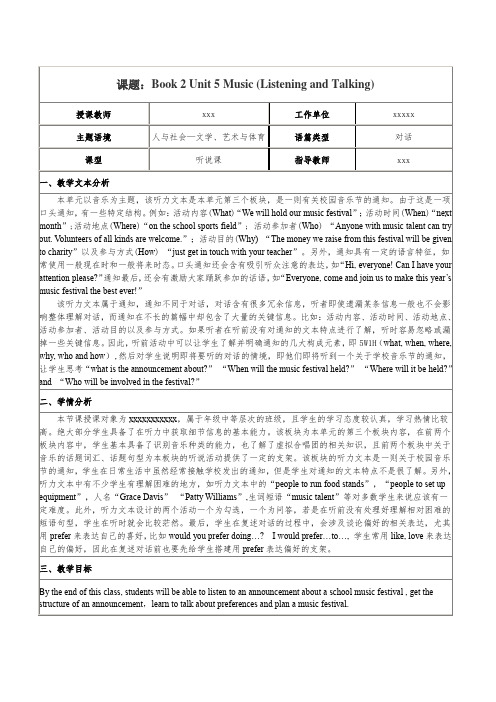
By the end of this class, students will be able tolisten to an announcement about a school music festival,get the structure of an announcement,learn to talk about preferencesandplan amusicfestival.
2. Listen for the second time to get the
the detailed information, the volunteer needed by the music festival. Then check answers and learn the English expressions of thevolunteers who are needed by the music festival.
5.Asks students to talk with groups membersto makea plan for a music festival. Then, provides students with a sample to organize what they have talked into an announcement.Finally, asks 3-4 group leaderstopresent their plans for music festivals.
3.Asks3 to 4 students to express their preferences and timely presents the sentence patterns used for expressing preferences.
新版pep英语四年级下册unit 6 Music教案
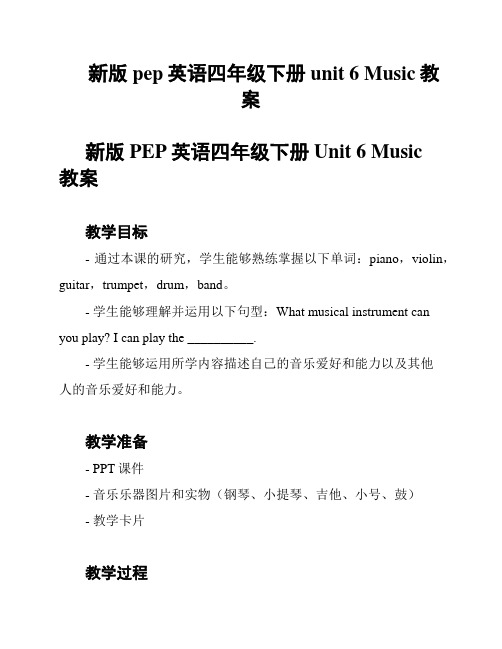
新版pep英语四年级下册unit 6 Music教案新版PEP英语四年级下册Unit 6 Music教案教学目标- 通过本课的研究,学生能够熟练掌握以下单词:piano,violin,guitar,trumpet,drum,band。
- 学生能够理解并运用以下句型:What musical instrument can you play? I can play the __________.- 学生能够运用所学内容描述自己的音乐爱好和能力以及其他人的音乐爱好和能力。
教学准备- PPT课件- 音乐乐器图片和实物(钢琴、小提琴、吉他、小号、鼓)- 教学卡片教学过程1. 导入新课- 师生问好,营造轻松的研究氛围。
- 教师出示钢琴、小提琴、吉他、小号、鼓的图片,引导学生观察并问答:“What musical instrument can you see? Can you play them?”(通过图片引发学生的兴趣,展示本节课主题)2. 研究新单词- 出示单词卡片,逐个教授单词的发音和拼写,并帮助学生记忆。
- 运用图片和实物展示,教授单词的意思和用法,与学生进行对话练,巩固记忆。
- 教师出示一张含有所有单词的海报,与学生一起合唱读音乐器的名称。
3. 研究句型- 教师出示句型“What musical instrument can you play?”,并进行语音模仿和情景演示,引导学生理解句型的用法。
- 学生分角色进行对话练,通过问答的方式熟悉并掌握句型。
4. 操练运用- 学生自由操练句型,描述自己喜欢和会玩的乐器,并与同学进行交流。
- 老师选取几名学生进行展示,并鼓励全班同学互相点评。
5. 巩固练- 教师出示练册的相关题,巩固学生对本课单词和句型的掌握程度。
- 学生分组合作完成题,并带领学生互相检查和讨论答案。
6. 课堂总结- 教师对本节课的研究内容进行总结,强调所学的乐器名称和相应的句型。
- 学生在教师的引导下,进行自我总结并给自己打分。
Unit 5 Music 教案
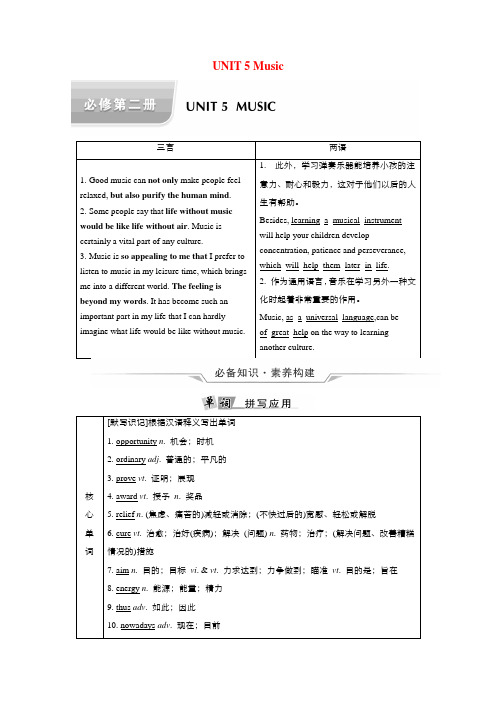
UNIT 5 Music三言两语1. Good music can not only make people feel relaxed, but also purify the human mind.2. Some people say that life without music would be like life without air. Music is certainly a vital part of any culture.3. Music is so appealing to me that I prefer to listen to music in my leisure time, which brings me into a different world. The feeling is beyond my words. It has become such an important part in my life that I can hardly imagine what life would be like without music. 1. 此外,学习弹奏乐器能培养小孩的注意力、耐心和毅力,这对于他们以后的人生有帮助。
Besides, learning_a_musical_instrument will help your children develop concentration, patience and perseverance, which_will_help_them_later_in_life.2. 作为通用语言,音乐在学习另外一种文化时起着非常重要的作用。
Music, as_a_universal_language,can beof_great_help on the way to learning another culture.核心单词[默写识记]根据汉语释义写出单词1. opportunity n. 机会;时机2. ordinary adj. 普通的;平凡的3. prove vt. 证明;展现4. award vt. 授予n. 奖品5. relief n. (焦虑、痛苦的)减轻或消除;(不快过后的)宽慰、轻松或解脱6. cure vt. 治愈;治好(疾病);解决(问题) n. 药物;治疗;(解决问题、改善糟糕情况的)措施7. aim n. 目的;目标vi. & vt. 力求达到;力争做到;瞄准vt. 目的是;旨在8. energy n. 能源;能量;精力9. thus adv. 如此;因此10. nowadays adv. 现在;目前20. metaphor n. 暗喻;隐喻21. personification n. 拟人;人格化;化身22. repetition n. 重复;重做23. simile n. 明喻24. outline n. & vt. 概述;概要25. onto prep. (朝)向26. conductor n. (乐队、合唱团等的)指挥;(公共汽车的)售票员27. hip-hop n. 嘻哈音乐;嘻哈文化28. phenomenon n. 现象熟词生义1. (2020·全国卷Ⅱ)The family called the Italian Culture Ministry; the official confirmed that the paintings were originals and worth as much as $50 million. 原作2. If there is no president, power will be assumed by the most extremist forces. 掌管;夺取3. (2018·江苏卷)The economic impact of the arts is often overlooked and badly judged. 冲击力高频短语短语应用1. absorbed_in_sth./sb.被……吸引住;专心致志2. try_out参加……选拔(或试演)3. in_addition_(to_sb./sth.) 除……以外(还)4. from_(then)_on 从(那)时起5. fall_in_love_with爱上6. get_through (设法)处理;完成7. feel_like 想要……;感觉像8. come_up_with提出;想出9. on_stage 在舞台上10. set_sth._up 安装好(设备或机器) [语境运用1]填入一个适当的词1. I couldn't get through to Hannah. Her brother was talking on the phone all the time!2. In addition to these arrangements, extra ambulances will be on duty until midnight.3. He came up with a good solution to the problem at the meeting.[语境运用2]填入一个适当的词He was given a football as a birthday gift at the age of three. From then 1. on,he has been absorbed 2. in playing football. In 3. addition,he wants to try 4. out for the football team when he grows up.教材原句背诵句式仿写应用1. while引导时间状语从句Imagine having the opportunity to sing together with hundreds of other people while you are at home alone. 当我在那个美丽的国家从事志愿者工作时,我结交了很多新朋友。
2019统编人教版高中英语必修第二册unit 5《Music》全单元教案教学设计
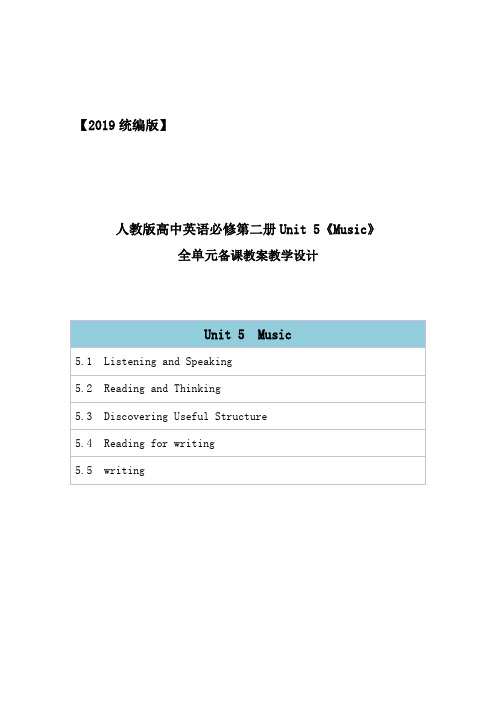
【2019统编版】人教版高中英语必修第二册Unit 5《Music》全单元备课教案教学设计Unit 5 MusicListening and Speaking【教学目标】1. Instruct students to get main facts by listening and motivate them to talk about the topics about music, the types of music, and how the music makes them feel.2. Develop students’ sense of cooperative learning and individual thinking capability.3. Develop students’ different listening skills to solve different listening comprehensive problems.4. Help students to understand how to use the structures “past participle as adverbial”.【教学重难点】Prompt students to talk about the related topics, such as types of music they know, their favourite type of music, how music makes them feel, and how to use past participle as adverbial.【教学过程】Step 1 Lead inThe teacher is advised to talk with their students about music.Boys and girls, before we listen, let’s work in pairs and discuss what type of music you know.Which type is your favorite? How does it make you feel? Share your ideas with partners.I know Chinese traditional music/classical music/country music/hip-hop/jazz/pop music/Latin music/rap/rock/punk…I like classical music. It makes me feel full of energy and happy.Step 2: PredictionAfter their small talk, the teacher can move on by finishing the following task: See the pictures and give the correct answers.1. What are the people doing in the picture below?2. Match the pictures with the correct types of music.A. Chinese traditionalB. classicalC. country musicD. hip-hop1_______________2_______________3_______________4_______________Step 3: Summary of the main ideaListeningI. Play the radio about The Sound of Music (音乐之声), and let students finish the following tasks.A star has come out to tell me1.___________________ to goBut deep in the dark-green shadowsAre voices that urge me to staySo I pause and I wait and I listenFor one more sound for one more lovely thing2.___________________ might say…The hills are alive with the sound of musicWith songs they have sung 3.__________________The hills fill my heart with the sound of musicMy heart 4.__________________ every song it hearsMy heart wants to beat like the wings of the birds that rise from the lake to the treesMy heart wants to sigh like the chime that flies from a church on a breezeTo laugh like a brook 5.__________________ and falls over stones in its wayTo sing through the night like a lark who is 6._____________I go to the hills when my heart is lonelyI know I will hear what I’ve heard beforeMy heart will 7.______________ the sound of musicAnd I’ll sing once moreII. The reporter paraphrased some of the answers the students gave him. Listen to the interviews again and complete the sentences with the words you hear.1. A: Country music touches my heart.B: So you like music that’s _______of _______?2. A: When I listen to hip-hop, I just have to move!B: So it makes you want to _______?3. A: Classical music makes me feel like I’m sitting beside a quiet stream and enjoying nature.B: So to you, it’s _______ and _______?Learning new wordsList the new words in the lesson, tell students the meaning of these words and give some examples.News words: classical, energy, soul…Talking projectGuide students to do speaking practice.I. Talk in pairs. Interview each other about music. Use the picture below for ideas.A: What kind of music do you like?B: I like techno music.A: What makes it so special to you?B: I like to listen to it when l exercise. It gives me energy.II. Work in pairs or groups and role play a conversation.●Suppose you are a reporter and interviewing the students who about music.➢I like to…➢Chinese traditional song/classical music/hip-hop music/country music…➢Listen to/play/sing…Unit 5 MusicReading and Thinking【教学目标】1. To acquire the basic usage of the new words and express concerning how computers and the Internet help us experience music.2. Enable students to understand the main information and text structure of the reading text.3. Enable students to understand past participle as adverbial.【教学重难点】1. Guide students to pay attention to reading strategies, such as prediction, self-questioning and scanning.2. To talk about the advantages and disadvantages of being a member of virtual choir.3. Lead students to understand past participle as adverbial;【教学过程】Step 1 PredictionAsk students the question.How can computers and the Internet help us experience music differently?Step 2: Learning new wordsLearn words:perform,enable,prove,award,and fall in love with…New words practiceIn order to have a good _______________ (perform), I have made good preparations for it.At present, developing the ___________ (able) of the students is an important task in our daily teaching activity.Step 3: Learning sentence patternsIntroduce the sentence patterns in the lesson and give some examples and explanation1. as 引导定语从句,意为“正如,正像”2. 过去分词(短语)作状语as引导定语从句的常用句式有:as is known to all 众所周知as we all know我们都知道as we can see正如我们所看到的as is reported正如报道的as is often the case这是常有的事as is mentioned above如上所述Step 4: Fast reading tasksGuide student to read the article quickly, teach some reading skills and do some exercises.Task of the first fast reading:Read quickly and figure out the key words of each paragraph.•Paragraph 1: enable•Paragraph 2: award•Paragraph 3: performanceTask of the second fast reading:1. What is mainly discussed in this passage?2. Which paragraph mentions background information about the virtual choir?3. Which paragraph mentions the conclusion of the virtual choir?Step 5: Careful reading tasksGuide student to read the article carefully and do some exercises.1. What is the attitude towards the virtual choir?2. Why does the virtual choir prove to be a good influence on the lives of many people?3. If you want to take part in a virtual choir, you need….Step 6: Study reading tasksAnalyze two difficult sentences in the text.1. Imagine having the opportunity to sing together with hundreds of other people while you are at home alone.2. A virtual choir enables them to add their voices to those of other individuals and become part of the global community.Step 7 Homework:Review what we have learned and find out the key language points in the text.Unit 5 MusicDiscovering Useful Structure【教学目标】1. Get students to have a good understanding the basic usage of past word segmentation as past segmentation as predicative and adverbial.2. Strengthen students’ great interest in grammar learning.3. Instruct students to express their ideas with this grammar correctly.【教学重难点】How to enable students to use the structure and meaning of past word segmentation as past segmentation as predicative and adverbial.【教学过程】Step 1 Lead-inGive some messages and ask students to guess who she is.英语过去分词的句子。
高中英语必修 music第一节教案人教新课标

Activity1.fill in the blank(3m’)
T:we have read the passage for three times,now;do the exercise fill— in the blank. 2 minutes for you.…..Haveyou finished?Let’s read it together.
S2:(possible answer)I like classical music because it isserious and make people inspireD.It can last long.
S3:…
T:Well done.Now come to next question.Who want to talk about?Any volunteer?
Unit5Music第一节教案
阅读课文题目:The band that wasn’t
教学目的、要求:
1.知识目标:熟悉掌握本课新单词和词组的意思;帮助理解阅读文本。
2.技能目标:锻炼快速阅读能力,理解文章大意;锻炼详细阅读能力,提取、筛选和重新组织文章中的信息。
3.情感态度目标:培养学生对音乐的了解,增加对音乐的兴趣,培养学生合作精神。
[设计说明]:通过学生熟悉的音乐知识引入本单元的话题音乐,继而直接引入音乐的种类,扩大学生的知识量。
Activity2.Listenand guessing(5m’)
T:now, turn to page33, look at the pictures, read the captions and listen to the different kinds of musiC.See if you can guess which music matches with which picture.
小学六年级英语music教案
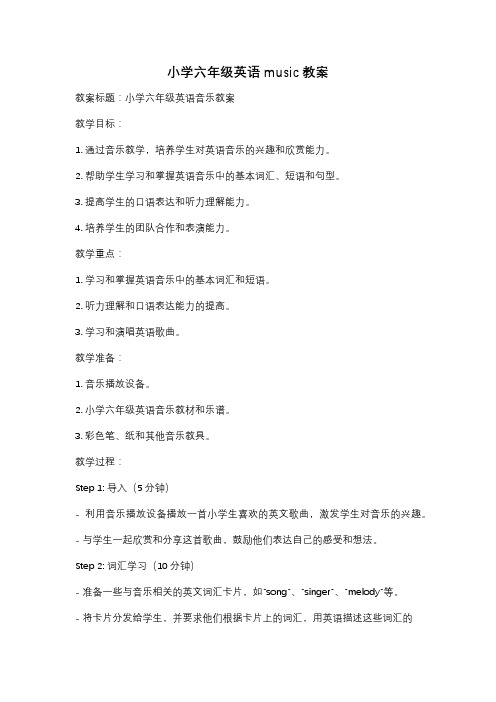
小学六年级英语music教案教案标题:小学六年级英语音乐教案教学目标:1. 通过音乐教学,培养学生对英语音乐的兴趣和欣赏能力。
2. 帮助学生学习和掌握英语音乐中的基本词汇、短语和句型。
3. 提高学生的口语表达和听力理解能力。
4. 培养学生的团队合作和表演能力。
教学重点:1. 学习和掌握英语音乐中的基本词汇和短语。
2. 听力理解和口语表达能力的提高。
3. 学习和演唱英语歌曲。
教学准备:1. 音乐播放设备。
2. 小学六年级英语音乐教材和乐谱。
3. 彩色笔、纸和其他音乐教具。
教学过程:Step 1: 导入(5分钟)- 利用音乐播放设备播放一首小学生喜欢的英文歌曲,激发学生对音乐的兴趣。
- 与学生一起欣赏和分享这首歌曲,鼓励他们表达自己的感受和想法。
Step 2: 词汇学习(10分钟)- 准备一些与音乐相关的英文词汇卡片,如"song"、"singer"、"melody"等。
- 将卡片分发给学生,并要求他们根据卡片上的词汇,用英语描述这些词汇的意思。
- 引导学生一起讨论这些词汇的用法和意义。
Step 3: 歌曲学习(20分钟)- 选择一首适合小学六年级学生的英文歌曲,如"The Wheels on the Bus"。
- 先给学生播放这首歌曲的原版录音,让他们跟着节奏摇摆身体,感受音乐的节奏和韵律。
- 分段教学歌曲的歌词,帮助学生理解和掌握歌曲的意思。
- 逐句教唱歌曲,并鼓励学生跟着音乐的节奏一起唱。
Step 4: 表演和评价(15分钟)- 将学生分成小组,每个小组选择一首英文歌曲进行表演。
- 学生可以自由选择表演形式,如合唱、舞蹈等,但要求至少包含一段英文歌唱。
- 学生进行表演后,其他小组进行评价和点评,鼓励互相学习和改进。
Step 5: 总结和反思(5分钟)- 与学生一起回顾本节课所学的内容,总结学生的学习收获和感受。
- 鼓励学生分享自己在音乐学习中的困惑和问题,并给予解答和指导。
Unit5下册Music教案

Unit 5 MusicPeriod 1 (Reading)Teaching aims:Students will be able to:Sum up the main idea of each paragraph.Understand the details about the passage.Procedures:Step 1 Warming-upBefore the class begins, let the Ss enjoy “I’m a believer” played b y “The Beatles”.Let the Ss enjoy some different kinds of music on the tape and ask them to match the music with the right picture.Step 2 Pre-readingTalk about the famous bands in the world. (P33 Pre-reading)Ask the Ss: Have you heard about any of the famous bands in the world? List some if you have.Then the teacher will show the Ss some pictures of some famous bands like “The Beatles”, “Backstreet Boys”, “West Life” and “Zero O’clock” on the screen and ask the Ss to name the bands and tell the teacher where they come from.Ask the Ss: Which one do you like best? Why?Ask the Ss: Dou you know anything about “The Monkees”?Then the teacher will show the Ss two pictures of “The Monkees” and say: If you want to know more about “The Monkees”, pleas e turn to Page33 and let’s come to Reading “The Band That Wasn’t”. Step 3 While-readingFirst reading:read the passage again and then answer the following questions: Why do most musicians like to be in a band with others?Which two musical bands are mentioned in the passage?How do some bands formed by high school students earn extra money?When did the “Monkees” break up and when did it reunite?? Second reading:Get the main idea of each paragraph. (Finish P35, Ex 2)Step 4 Post-readingGive the Ss the following adjectives “popular, lively, funny, foolish, attractive, brave, crazy, noisy, classical, rich, honest, famous” and ask them to choose the ones that they think best describe “The Monkees” and give their reasons. (Finish P35 Ex 3)(The teacher will first ask the Ss to discuss in pairs and encourage the Ss to express their opinions. There is no definite answer.)Step 5 DiscussionDiscuss the following topics in groups of four.What can we learn from “The Monkees”?If you are to form your own band, what will you do?(After discussion, ask the Ss to express their own opinion.)Step 6 SummaryToday we have enjoyed some beautiful music and learn something about some famous bands. Remember:Success lies in hard work.Step 7 HomeworkRetell the text.Collect some information about your favorite music.。
- 1、下载文档前请自行甄别文档内容的完整性,平台不提供额外的编辑、内容补充、找答案等附加服务。
- 2、"仅部分预览"的文档,不可在线预览部分如存在完整性等问题,可反馈申请退款(可完整预览的文档不适用该条件!)。
- 3、如文档侵犯您的权益,请联系客服反馈,我们会尽快为您处理(人工客服工作时间:9:00-18:30)。
Step4
Homework
Introduce your favorite instrument to your friends.
Preview the text about LiuFang.
检测学生对本节知识的掌握情况,以及学生说的能力
板书设计:
教学反思(teaching reflection)
3,Let’slearn more information aboutChinese musical instruments.Try to introduce them to the whole class.
4.let’s guess and say
利用头脑风暴,学习乐器的新单词。又复习了以前的乐器词汇。
让学生通过2.3练习,自主阅读思考,然后归纳,提高学生课堂上说的能力,增加对音乐文化的了解。做到学生为主,教师为辅。
利用这个游戏,激发学生对各种乐器的兴趣
Step 3
Speaking.
If Mr. Obama comes toChina,please introduce your favorite Chinese musical instrument to him.
Teaching Aims
1 Knowledge and Skills:to learn the words ofmusical instrument.
2 Process and Methods: to improve students’speakingability by group activities, self-readingand individual thinking.
Music教学设计
教材:外研版高中《英语》第六册module 4
课题名称
Music
科目
sh
教学时间
One lesson about 40 minutes
学习者分析
Students from grade 2 in senior high school have been learning English for several years, so they have caught basic English knowledge and can use English freely. The problem is that most of them hold no interest in it, so this lesson will greatly improve their interests in it through music.
3 Attitude and Value: to let students learn from this lesson:no pains, no gains.
Focus and Difficulties of Teaching:
This lesson focuses on the words of musical instruments
设计意图
Step1
Do you like his/her performance?
用学生表演的方式导入新课,提高学习兴趣和参与课堂积极性
Step2
New Knowledge
1, Brainstorm.
Look at the pictures, and then tell their names.
2,Look at the pictures, and then answer the following questions.
My favorite Chinese instrument is guzheng. It has been used for more than 2,300 years and looks like a table harp. I like its melody
No pains, no gains
_____________________________________________________________________________________________________________________________________________________________________________________________________________________________________________________________________
①.Which instruments have strings?
②.Which Chinese and western instruments look similar?
③.Which of the instruments does the musician hold when he/she is playing?
The information for these musical instruments is difficult for students.
Tools of Teaching
a multi-media computer, a blackboard.
Teaching Procedure
Music(Introduction)
